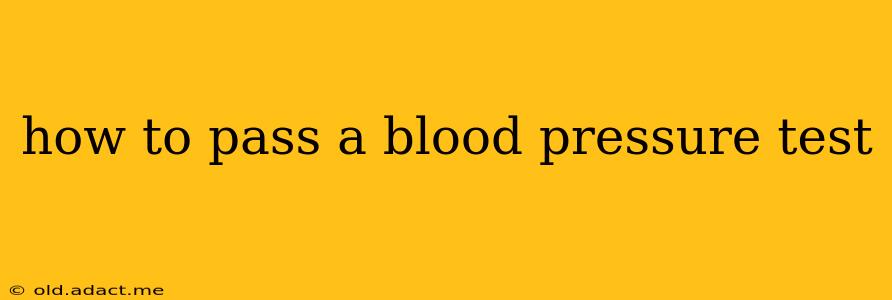High blood pressure, or hypertension, is a serious health concern affecting millions worldwide. While there's no quick fix to permanently lower blood pressure, understanding how blood pressure is measured and taking steps to manage your readings can help you achieve healthy results during a blood pressure test. This guide provides information on how to prepare for a blood pressure check, what to expect during the test, and long-term strategies for managing your blood pressure. Remember, this information is for general knowledge and should not replace advice from your doctor. Always consult with your healthcare provider for personalized guidance.
What Affects Blood Pressure Readings?
Several factors can influence your blood pressure reading, including:
- Stress and Anxiety: Nerves before a test can significantly elevate your blood pressure. This is a common reason for inaccurate readings, especially during initial screenings.
- Caffeine and Nicotine: Both stimulants can temporarily raise your blood pressure. Avoid consuming these substances for at least 30 minutes before your test.
- Physical Activity: Strenuous exercise directly before a blood pressure test will likely result in an elevated reading. Allow sufficient rest time before the test.
- Full Bladder: A full bladder can slightly increase blood pressure readings.
- White Coat Hypertension: Some individuals experience elevated blood pressure solely in clinical settings due to anxiety. This phenomenon is known as "white coat hypertension."
- Medication: Certain medications can influence blood pressure readings. Inform your doctor about all medications you are taking.
How to Prepare for a Blood Pressure Test
To obtain the most accurate blood pressure reading, follow these steps:
- Rest: Rest quietly for at least five minutes before your blood pressure is taken. This allows your body to return to a resting state.
- Avoid Stimulants: Refrain from caffeine and nicotine for at least 30 minutes prior to the test.
- Comfortable Position: Sit comfortably with your back supported and your feet flat on the floor. Avoid crossing your legs.
- Arm Position: Ensure your arm is supported at heart level. The cuff should be placed snugly but not too tightly.
- Relax: Try deep breathing exercises to help manage any anxiety you might be feeling.
What Happens During a Blood Pressure Test?
A blood pressure test is quick and painless. A healthcare professional will:
- Place the Cuff: They will wrap a cuff around your upper arm.
- Inflate the Cuff: The cuff will inflate, compressing your brachial artery.
- Listen for Sounds: Using a stethoscope, they will listen for the sounds of your blood flowing through the artery.
- Record the Readings: The systolic (top) and diastolic (bottom) numbers will be recorded.
Can I Lower My Blood Pressure Before a Test?
While you can't significantly lower your blood pressure immediately before a test in a way that would mask underlying hypertension, you can mitigate the impact of factors that might artificially raise it. Focus on the preparation steps mentioned earlier. However, if you have consistently high blood pressure, you must discuss this with your physician. Attempting to artificially lower your blood pressure for a test could be harmful.
How Can I Lower My Blood Pressure Long-Term?
Managing blood pressure is a long-term commitment, requiring lifestyle changes and, in many cases, medication. Your doctor can recommend the most appropriate course of action for you based on your individual health profile. Here are some strategies that can help:
- Dietary Changes: Follow a balanced diet low in sodium, saturated fats, and cholesterol. Increase your intake of fruits, vegetables, and whole grains. The DASH diet (Dietary Approaches to Stop Hypertension) is often recommended.
- Regular Exercise: Aim for at least 150 minutes of moderate-intensity aerobic exercise per week.
- Weight Management: Maintaining a healthy weight can significantly lower blood pressure.
- Stress Reduction: Practice stress-reducing techniques such as yoga, meditation, or deep breathing exercises.
- Limit Alcohol: Moderate or avoid alcohol consumption.
- Quit Smoking: Smoking significantly increases blood pressure.
What is considered a normal blood pressure reading?
Normal blood pressure is generally considered to be less than 120/80 mmHg. However, your doctor will consider your individual medical history and other factors when evaluating your blood pressure.
What if my blood pressure is high?
If your blood pressure is consistently high, it's crucial to consult your doctor immediately. They will perform a thorough evaluation and recommend appropriate treatment, which may include lifestyle changes and/or medication.
This information is intended for general knowledge and does not constitute medical advice. Always consult with your healthcare provider for any concerns about your blood pressure or health.
